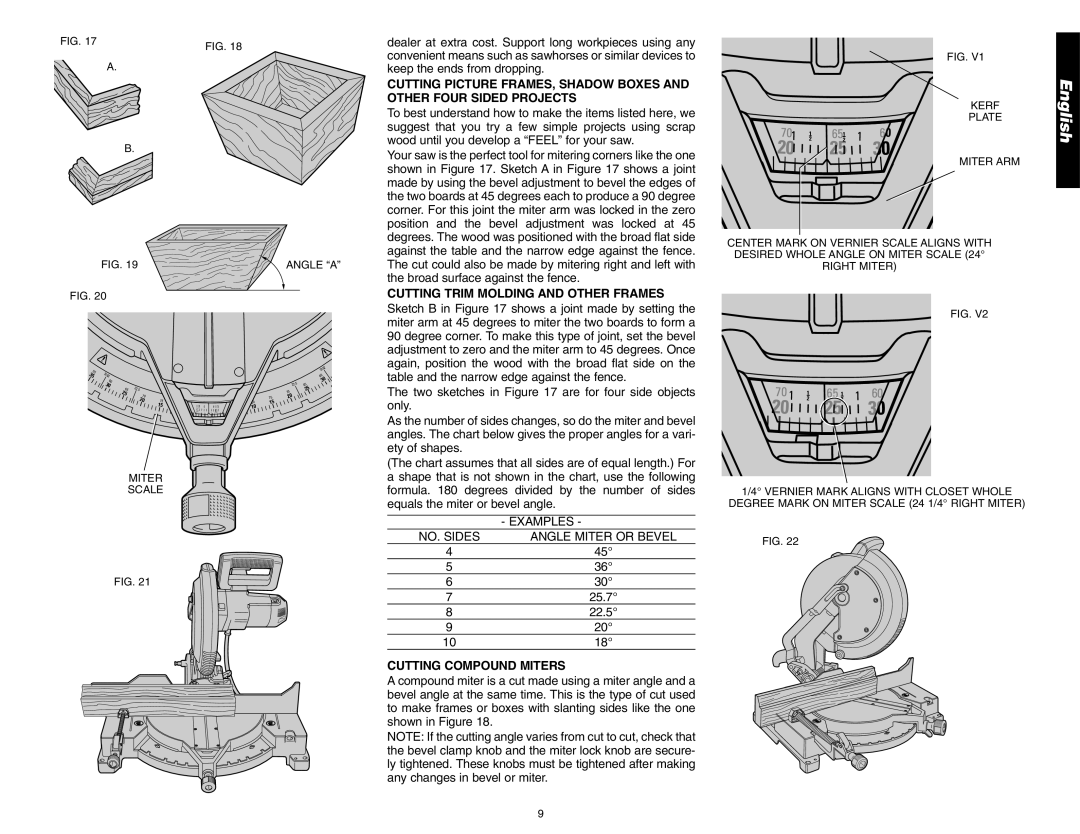
FIG. 17 | FIG. 18 |
| |
| A. |
B.
FIG. 19 | ANGLE “A” |
FIG. 20
|
|
|
|
|
|
|
|
|
|
| .62 |
55 |
|
|
|
|
|
|
|
|
|
| 31 |
62 |
|
|
|
|
|
|
|
|
| 60 | |
35 |
|
|
|
|
|
|
|
|
| ||
| 31. |
|
|
|
|
|
|
|
|
|
|
| 60 |
|
|
|
|
|
|
|
|
| 30 |
| 30 | 22.5 |
|
|
|
|
|
|
| 22.5 | 65 |
| 65 |
|
|
|
|
|
|
|
| 25 | |
| 25 | 70 |
|
|
|
|
|
|
| 70 |
|
|
|
|
|
|
|
|
| 75 | 20 |
| |
|
| 20 | 75 |
|
|
|
|
|
| ||
|
|
|
|
|
| 80 | 15 |
|
| ||
|
|
| 15 | 851 | 2 | 2 | 901 |
|
| ||
|
|
| 10 |
|
|
| |||||
|
|
|
|
| 1 | 1 |
|
|
|
|
|
|
|
|
| 5 |
|
| 0 |
|
|
|
|
MITER
SCALE
FIG. 21
dealer at extra cost. Support long workpieces using any convenient means such as sawhorses or similar devices to keep the ends from dropping.
CUTTING PICTURE FRAMES, SHADOW BOXES AND OTHER FOUR SIDED PROJECTS
To best understand how to make the items listed here, we suggest that you try a few simple projects using scrap wood until you develop a “FEEL” for your saw.
Your saw is the perfect tool for mitering corners like the one shown in Figure 17. Sketch A in Figure 17 shows a joint made by using the bevel adjustment to bevel the edges of the two boards at 45 degrees each to produce a 90 degree corner. For this joint the miter arm was locked in the zero position and the bevel adjustment was locked at 45 degrees. The wood was positioned with the broad flat side against the table and the narrow edge against the fence. The cut could also be made by mitering right and left with the broad surface against the fence.
CUTTING TRIM MOLDING AND OTHER FRAMES
Sketch B in Figure 17 shows a joint made by setting the miter arm at 45 degrees to miter the two boards to form a 90 degree corner. To make this type of joint, set the bevel adjustment to zero and the miter arm to 45 degrees. Once again, position the wood with the broad flat side on the table and the narrow edge against the fence.
The two sketches in Figure 17 are for four side objects only.
As the number of sides changes, so do the miter and bevel angles. The chart below gives the proper angles for a vari- ety of shapes.
(The chart assumes that all sides are of equal length.) For a shape that is not shown in the chart, use the following formula. 180 degrees divided by the number of sides equals the miter or bevel angle.
| - EXAMPLES - |
NO. SIDES | ANGLE MITER OR BEVEL |
4 | 45° |
5 | 36° |
6 | 30° |
7 | 25.7° |
8 | 22.5° |
9 | 20° |
10 | 18° |
CUTTING COMPOUND MITERS
A compound miter is a cut made using a miter angle and a bevel angle at the same time. This is the type of cut used to make frames or boxes with slanting sides like the one shown in Figure 18.
NOTE: If the cutting angle varies from cut to cut, check that the bevel clamp knob and the miter lock knob are secure- ly tightened. These knobs must be tightened after making any changes in bevel or miter.
FIG. V1
KERF
PLATE
70 | 2 | 65 | 1 |
1 | 2 | ||
20 | 1 | 1 |
|
| 25 |
|
MITER ARM
CENTER MARK ON VERNIER SCALE ALIGNS WITH DESIRED WHOLE ANGLE ON MITER SCALE (24° RIGHT MITER)
FIG. V2
70 | 1 | 1 | 65 | 1 | 1 | 0 |
| 2 | 2 | ||||
|
|
| 25 |
|
| |
1/4° VERNIER MARK ALIGNS WITH CLOSET WHOLE
DEGREE MARK ON MITER SCALE (24 1/4° RIGHT MITER)
FIG. 22
English
9
